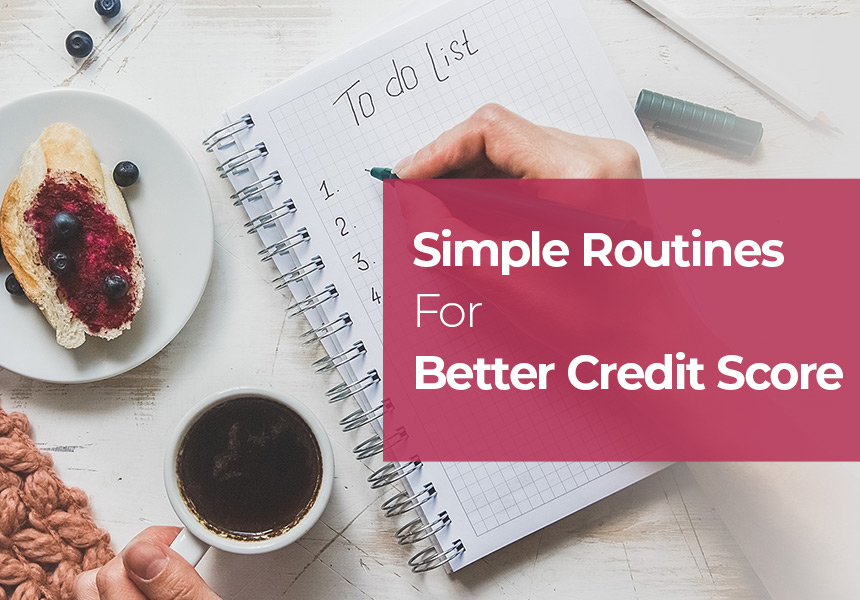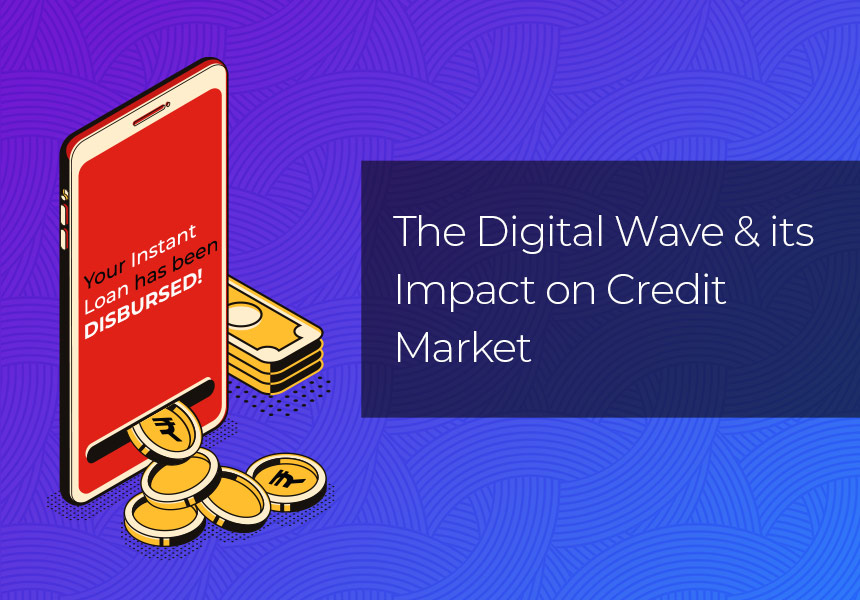With each passing year, we grow and resolve to be consistent in improving our habits. Eating healthy and staying fit top the list of new year resolutions, followed by setting some strong financial goals. Enjoying an international trip or buying a new model of your favorite bike or car, all require planning. Even if you wish to fulfil your dreams by taking a personal loan, you need to consider your budget. With your current income and expenses, will you be able to accommodate EMI (equated monthly instalment) payments?
Today, several types of personal loans are easily available in the market, and if you maintain a good credit score, you will get these loans online at a great interest rate with favorable loan terms. No matter what your monthly income, the lender will consider your credit score before lending you money.
What is Credit Score and how does it work?
When you take financial credit, either in the form of a credit card or a loan, the lender expects you to return the money (lump sum, minimum payment, or monthly EMIs) regularly and on time. Failure to do this will harm your credibility and show up in your financial profile. This automatically impacts your credit score.
Credit Information Report
This is a report that lists the history of one’s debt and payment details, including those related to credit cards and loans. The report contains detailed information regarding the loan status and payments of credit cards. The report also gives information of whether loans have been settled, partially paid, or defaulted. These credit reports are provided by many institutions in India, but the one provided by CIBIL TransUnion is considered most dependable and accurate.
Credit Score
This score is generated based on the information in your credit report. It is a statistically obtained 3-digit number between 300 and 900. This score determines your creditworthiness. Based on your score, the lender will gauge the risk involved in providing the loan or credit card to you. A score of at least 700 can help inspeedier approvals for loans. Your credit score also helps the lender decide your loan interest rates. If your score is higher, the lender may provide you a personal loan at a lower interest rate. For credit cards, it helps the lender fix the credit limit. Higher the score, higher the credit limit.
You can check your credit score on the CIBIL TransUnion official site. They provide you one free credit report annually. It is very important to check for your credit report and score on their official website in order to be sure of its authenticity. Do not use third party websites to check your score as it may not be genuine, and your details may get misused.
Unsure about Loan various terminologies? Understand complex terminologies in our blog on Decoding Loan Jargon – Personal Loan Glossary
Factors that Affect your Credit & CIBIL score
There are multiple factors that affect your credit score. Making timely payments is just one of them. Let us look at other aspects that affect your scores:
- Credit utilization Ratio (CUR): This is the ratio between your used and available credit limit. For instance, you have a credit card with a limit of INR 1,00,000 and you spend INR 60,000; this means your credit utilization ratio is 60%. A desirable ratio for a good credit score is 30%. If your CUR is higher, your credit score is affected. Therefore, you must ensure that your credit card usage is under control and within the permitted limit.
- Loan Enquiries It’s a human tendency to look at different lenders and compare their products before availing a loan. But did you know that every hard enquiry made for a loan is recorded and affects your credit score. So, if you approach 4-5 lenders for home loan enquiry, your credit score gets affected every time a lender checks your eligibility.
- Payment Patterns: Regular and timely payments of debts help you maintain a healthy credit score. Any pre-closure or part payments affect your score. Sudden payments make your financial records look unstable. If you are using a credit card and rather than making full payment of the bill, you opting to pay only the minimum due, this will signal the lender that you have insufficient funds to manage your credit and severely hamper your credit history.
- Taking Too Many Loans: The more loans you take, higher the negative impact on your credit score. This may show that you are financially unstable and are more dependent on financial credit. Also, if you have too many active loans, it will depict that you are trapped in a series of debts.
Learn More in our: Definitive Guide to Factors Affecting CIBIL Score
How to Improve your Credit & CIBIL Score?
If you focus on understanding how numerous factors impact your score, you can take cognizant measures to improve them.
1) Make Timely payments
The credit reports show the pending and unpaid EMIs along with the dates and number of days for which they have remained unpaid. This information is reflected in your credit report. Use reminders to help you with regular payments and set up auto payments to make each payment on time.
More ideas in our blog on: How to Manage your Loan Payments
2) Check your Credit Information Report Regularly
Make it a habit to check your credit report regularly. This will help you track any default or overdue payments that you may have incurred. Sometimes, the information related to payments and loan closure may have not been updated or there may be an error in your report. Regular monitoring will help you identify and fix such errors. You can buy your credit report and credit score from CIBIL for a fee and it is made accessible to you within 3 business days.
You can fix the inaccurate information in your report by initiating the dispute resolution process at CIBIL. You can opt for CIBIL’s online dispute process for free. There are factors like non-payments due to job loss or job relocation that can be fixed by making timely payments once you are settled or financially stable. Sometime there are disputes between the lender and the borrower such as dispute on annual charges or dispute on account of fraud on your cards. These need to be settled by the applicant directly with the bank or the lender so that your credit history is not affected.
3) Limit your Loan Enquiries or Applications
As mentioned earlier, every time you apply for a loan, the lender approaches CIBIL for your score. Each enquiry is recorded and affects your credit score negatively. Therefore, avoid applying for loans and credit cards with too many lenders
Many applications will reflect your need for more credit. An impact on your score will only bring down your creditability.
4) Avoid settlements of loans and credit card
When people are unable to pay their loans and credit card bills, they tend to opt for settlements. This means that a certain amount is agreed upon by the lender and the borrower to close the loan. The amount is lower than the main outstanding amount.
Settlements are recorded in your credit information reports and lowers your credit score.
5) Avoid taking too many loans at same time, use credit prudently
Too many active loans show that you are someone who needs to borrow money constantly to manage his/her finances. Therefore, it is not a clever idea to have too many active loans at one time.
If you wish to maintain a good credit score, try to repay the existing loan before taking a fresh one. This will reflect discipline of timely payments and lenders will be more than happy to provide fresh loans at competitive rates.
Learn more in our blog: Make Year 2020 about Credit Consciousness
6) Opt for a mixed bag of debt or credit
There are basically two types of loans available in the market, secured and unsecured. The home loans or education loans where you provide a collateral to get a loan are termed as secured loans. Personal or term loans that do not require any type of collateral are called unsecured loans.
If your portfolio reflects too many unsecured loans, it may have a negative impact on your score. Therefore, opt for credits of both types to maintain a balance of your financial portfolio. This will also help you create a sound credit history.
7) Opt for longer tenure on your loans
When the tenure of your loan is more, your EMI will be considerably lower. A smaller EMI amount would mean less chances of defaulting on payments. When you don’t default and make regular payments for your loan for an extended period of time, your score will improve.
8) Monitor loans with joint applicants closely
When you are a co-applicant on loans taken jointly, be alert and monitor the payments of your partners closely. If the joint applicant defaults on payments, it could affect your credit score too. Though you may not be at fault in this, yet you must take the fall.
The non-payments will reflect in your credit report, thus affecting your credit score.
9) If rejected, do not reapply immediately
If your loan application or credit card application gets rejected by one lender, do not reapply immediately with another vendor. Your first rejection is recorded in the credit report. If the new lender checks with CIBIL before approval, there are chances of your application getting rejected again.
So, before you make fresh application, it is better to wait for your scores to improve.
Conclusion
Knowing the importance of a good credit score will encourage you to take the necessary precaution while dealing with debts and credit products.
Monitoring your credit report is essential in order to eliminate errors. A good credit report will help you maintain a good credit score and will make borrowing easier for you.
At LoanTap, we provide customized loan products to suit everyone’s needs. Our personal loans ranging from ₹50,000 – ₹10,00,000 at extremely competitive interest rates. Contact us with your loan needs, and we will make sure your pocket doesn’t decide how big you dream!
Apply Today For an ⚡Instant Personal Loan with LoanTap. Download our Personal Loan App: Google Playstore / Apple App Store
CIBILCIBIL scoreCredit ScorePoor Credit Score












